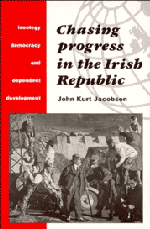Book contents
- Frontmatter
- Contents
- Acknowledgments
- Introduction
- 1 Reflex modernization: state, ideology and dependent development
- 2 Perils of planning: foreign capital, domestic policy, and the problem of state “strength”
- 3 The pale replica
- 4 The rising tide
- 5 Pushbuttons and pragmatists
- 6 Governability and corporatist compromise
- 7 Getting it right: debt, taxes, and industrial strategy, 1984–1990
- Afterword: 1991–1993
- Bibliography
- Index
Introduction
Published online by Cambridge University Press: 07 September 2010
- Frontmatter
- Contents
- Acknowledgments
- Introduction
- 1 Reflex modernization: state, ideology and dependent development
- 2 Perils of planning: foreign capital, domestic policy, and the problem of state “strength”
- 3 The pale replica
- 4 The rising tide
- 5 Pushbuttons and pragmatists
- 6 Governability and corporatist compromise
- 7 Getting it right: debt, taxes, and industrial strategy, 1984–1990
- Afterword: 1991–1993
- Bibliography
- Index
Summary
In a radio broadcast on Easter day 1943, Eamon DeValera, patriarchal Prime Minister of the Irish Free State, described his vision of a self-sufficient Gaelic nation replete with comely maidens, cosy homesteads and, presumably, a reunited Ulster. “The Ireland we dreamed of would be the home of a people who valued material wealth only as a basis of a right living,” the Fianna Fail party leader intoned, “of a people who were satisfied with a frugal comfort and devoted their leisure to things of the spirit. It would, in a word, be the home of a people living the life that God desired men to live.” In 1958 the autarkic policies Fianna Fail had promoted since it first assumed political power a quarter century earlier were abandoned without fanfare or remorse. A “post-revolutionary” generation of self-proclaimed pragmatists steered their fraction of the island into Europe – by which they meant the common market – and the era of push button technology. God evidently desired that the Irish enjoy more prosperity.
Banishing the donkey-and-cart age to Tourist Board posters the Irish Republic industrialized by introducing economic planning – cuphemized in the accurately timid term “programming” – and, more importantly, by converting itself into a haven for footloose capital. These two tactical strands interwove in a frayed way in the export-led development strategy by which policy-makers commenced “chasing progress.”
- Type
- Chapter
- Information
- Chasing Progress in the Irish RepublicIdeology, Democracy and Dependent Development, pp. 1 - 3Publisher: Cambridge University PressPrint publication year: 1994

